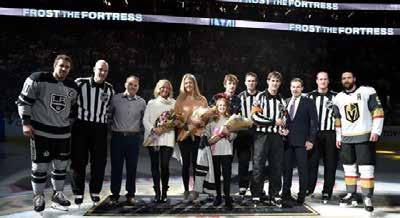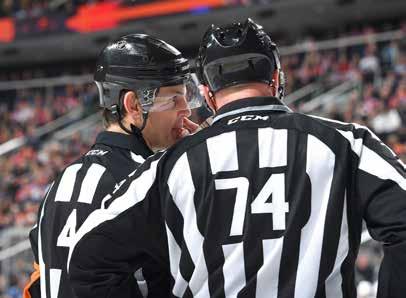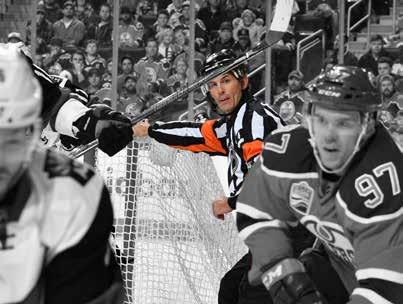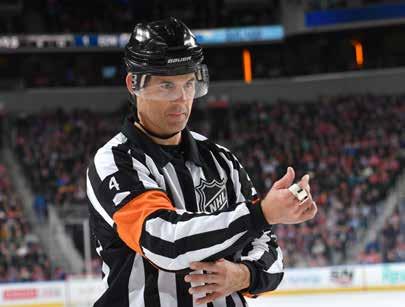
15 minute read
Interview with Wes McCauley
WES MCCAULEY NHL’s Top-Rated Referee
By Rob Suggitt Photos courtesy of Andy Devlin Edmonton Oilers Hockey Club
Being a hockey official is the only job in the world where you’re expected to be perfect your first day on the job, and improve from there
When you’re an NHL player, you want to keep playing past the regular season, and it’s no different for NHL officials. The ultimate goal is to reach the Stanley Cup Finals, and only the two best teams make it every year, and only the four highest rated referees are assigned games in the Cup finals. Wes McCauley has proven himself to be one of the top officials in the NHL, making it to the Stanley Cup Finals seven of the last eight seasons. (He was ready to do the finals in 2019, but a hamstring injury kept him out.) McCauley’s dream growing up was to make it to the NHL as a player. Drafted by the Detroit Red Wings in 1990 (6 positions ahead of Peter Bondra), McCauley played a lot of hockey in the minor leagues (Las Vegas, Knoxville, Muskegon, Fort Wayne), but never got the call up to the NHL. “Coming up, I always thought I was going to be a player. I played college hockey for Michigan State, and played 3 or 4 seasons in the minors. I was playing in Fort Wayne late in my pro career, and the coach there, Dave Farrish (former NHL player) wanted to chat with me after a pair of weekend games. I was feeling pretty good, because I thought I played well, so I’m meeting with Dave, and he says ‘there were a lot of scouts in the stands, and your name got brought up.’ So I’m feeling really good (thinking maybe this is my call-up to play in the NHL.) Dave continued ‘yeah – we were thinking with the NHL going with two referees, we’re looking at certain ex-players, and with your bloodlines, we think you’d make a real good referee.’ So here I was thinking that the scouts were talking about me going up, and as it turned out, I was going to be sent down to the United League.” As for “bloodlines,” McCauley’s dad John McCauley was an NHL referee from 1966 – 1981, a career which was stopped short due to an eye injury he sustained from an assault by a crazed hockey fan after a game between the NHL All-Stars and the Soviet Union in 1979. He tried working for a few years afterwards, but due to blurred vision, he had to give it up. Thereafter, the elder McCauley went on to become the Director of Officiating for the NHL, until his untimely death in 1989. He was only 44 years of age, and Wes was just 17 years old.
Did you ever get to see your dad (John McCauley) work?
“Oh yeah – we used to go to all the games he worked. I probably saw him work up until I was around 7 years old. I remember a game in Buffalo when they were playing the Leafs – these teams had a pretty good rivalry. I remember a very angry Tiger Williams knocking on the door, and asking why John threw him out of the game. John responded ‘I got the kid here,’ and looking over to where I was sitting, Tiger calmly responded ‘sorry John,” letting the issue go, then proceeded to take me over to the Leafs dressing room to meet the Leaf players.” A lot of people remember my dad, and have very nice things to say about him. For a man who’s been gone over 30 years, it’s pretty amazing to hear his name being brought up still. The biggest thing I learned from my dad was that he was happy for other people’s success. That’s a trait that I try to follow, and emulate. If you’re not jealous of other people, you’re probably a very content and happy person.”
Do you remember your first game?
McCauley states without hesitation “Chicago at Columbus,” and recites a number of NHL stars playing in that game: (Brent Seabrook, Duncan Keith, Martin Havlat, Patrick Sharp and Theo Fleury for the Blackhawks, and Rick Nash and Sergei Fedorov for the Blue Jackets.) McCauley adds that “Doug MacLean was coaching Columbus, and Brian Sutter was coaching Chicago.” 15
That was January 20, 2003. Since then, McCauley has gone on to officiate nearly 1,100 regular season games. He reached the 1000 game milestone on December 23, 2018. When you hit this mark, the NHL allows you to pick (with some limitations) the game or city where you officiate this game. McCauley picked Vegas, and a game just before the Christmas break. McCauley ranks it up there as his best experience. “It was unbelievable. I’ve been fortunate to do some big games, some Stanley Cups, and a few outdoor games. I would put game 1000 as 1A, and my brother (Blaine’s) first professional game as 1B as my most memorable games. Both Las Vegas and LA were tremendous to me and my family. It was kinda neat – they did a video presentation before the game, and brought my family onto the ice. It’s easy to forget the sacrifices our family makes for us to do what we do. To be recognized out on the ice (for something like this.) (My family) walked through the bench, walking past all these famous players, and to be up close near the players was pretty cool. My kids are all hockey players, and to see their faces when Kopitar and Engelland are coming over (to congratulate me.) To see the smiles on their faces, and the look of awe, it gave them a glimpse of what I do a little bit.”
Wes McCauley and Family Celebrating Wes’ 1000th game Photo Provided by the Las Vegas Golden Knights Hockey Club

“Another thing is you get to pick the crew, so over the course of your career, you come up with guys you’ve worked with alot, and are good friends. I picked Kevin Pollack, who I worked with in the East Coast League. He was kinda the senior guy when I was starting out. And Steve Barton and I were (also) in the East Coast League together, so we’re pretty good friends. The other linesman was Brian Murphy, who ironically was the last guy on staff who my dad (the late John McCauley) hired.”
What’s the best part of being an NHL referee?
“On the ice” he answered without hesitation, and with asserted glee. “I know I’m biased, but you’re on the ice with the best athletes in the world. It’s the next best thing to playing. You’re basically playing the game, you gotta kinda play the game a bit but without the stick. You gotta anticipate, you gotta think where they’re gonna go, what they’re going to do with the puck. You gotta stay out of the way. You have to think the game, almost like a player.” How important is training and fitness?
“I think it’s everything: health, diet, fitness. Just like the players, you know if you keep yourself in shape, you’re going to be out there, and it’s a great living. It really doesn’t feel like a job. I get paid to skate around with the best players in the world, travel to these great cities all over North America.”
“Most of the guys will meet for breakfast, have a bit of a workout. Fitness is so important, and that’s for the better. It’s better for the league. If you compare us to other officials in other sports – let’s say the optimal level of experience is 15 years or 16 years, because of the physical demands of our sport, we may not keep them as long. But the better we can stay in shape, you’re going to keep that experienced official for longer.” How important is communication?
“We have to (be good at communicating) with the players and coaches. I think it’s very important. A big part of our job is to keep the game fair and safe. They want to win, and they will do whatever it takes. But they look at us (partly) as the four guys who are in their way of winning. You have to manage this part carefully, and I think communication is a big part of it. I’m a believer that we have to work together, and get through the game together. We’re all going to make mistakes, but the key is that when you make a mistake, you don’t let it blow up on you.”
We have to (be good at communicating) with the players and coaches. I think it’s very important. A “ big part of our job is to keep the game fair and safe. They want to win, and they will do whatever it takes. “
Refs do 73 games a season, and usually see all 31 teams every season, and all 31 rinks. It’s rare for an NHL referee to do back to back games with the same team in the regular season, just so there’s not too much familiarity between teams and officials.
Playoff assignments are based on merit, and only 20 out of the 33 full-time NHL referees get assignments for the playoffs. (And the top 20 out of 33 full time linesmen.) And from there, the number of referee assignments diminished by round. (12 and 12 in the second round, then 8 and 8, then four and four.) Only the top four highest rated NHL referees get to officiate the Stanley Cup Finals, something all NHL referees aspire to. There are bonus dollars for every round worked, but it’s mostly pride and the thrill of working the most important games of the season that motivates officials to make these cuts. When asked how it feels to have been selected as one of the final four NHL referees seven of the past 8 seasons, Wes doesn’t gloat. ”It’s pretty humbling, and overwhelming, it’s always a goal. There were a lot of years when I just got in the business when it was just the first round for a number of years, and then one year I got to go to the conference finals, then the next year, I got chosen to do the finals. That was the Boston - Chicago final in 2013, and it was a really good series. McCauley went on to do the 6 out of the next 7 Stanley Cup Finals. Asked how many Cup winning games he’s reffed, McCauley thinks it was four – “it’s always great to see the Cup awarded. I did the one this year – we always stay around for the handshakes and Cup presentation. We’re back in the far corner,” he says with a laugh. “Some of the guys acknowledge you, skating over to say a few words or to give you a stick tap, which is a nice sign of respect.” What advice would you give to aspiring young hockey officials?


“Obviously you have to know the rules, how to skate, positioning, your mannerisms. The biggest thing is take care of the things you can control. Officiating sometimes requires a bit of a split personality – sometimes you need to be tough, and sometimes you need to be a bit of a hugger. At the youth level, the hardest thing is the parents. The youth hockey player has a coach and gets to practice, but there’s really no practice for being an official – it’s just game experience. It’s hard, but they have to have a lot of self-evaluation. You have to ask your peers how they would you handle or certain situation. Part of it is that you might not know you made a mistake – you may not have a mentor or supervisor at every one of your games.” The best advice I got early on, and because there was no video replay, was to get the goals (or non-goals) called right. Everyone wants to see goals. Get yourself in position behind the goal line to make the right call. If I’m waiving it off at the top of the circle, I’m probably catching the wrath of the players or coaches. I was always told early in my career ‘”get to the line, get to the net.’”
How many more years will you be doing this?
“How about until they cut the skates off me. (Laughs.) It’s going to be awhile. Maybe the goal should be 60? We’ve never had an official get into his 60’s.”
WES MCCAULEY ON BEING IN THE “BUBBLE”
The NHL announced the suspension of the NHL regular season on March 12th. McCauley was in Toronto, getting ready for the Leafs-Predators game the next day when he heard the news. “We received all the media reports that the season was going on pause. If you’re on the road, go home. If you were at home, stay home.” Weeks passed and the Coronvirus cases (and deaths) grew, and eventually the regular season was cancelled. McCauley (and other officials) stayed prepared. “In the back of my head, I always thought there was going to be playoffs. As officials, we never stopped. We would have virtual meetings, do game analysis, and do zoom workouts. As an officiating crew, we kinda kept rolling, ready to go anytime. “ Did it matter what bubble cities were chosen?
“Nope. (Quick answer.) I just couldn’t wait to go back. There’s no real bad city in the NHL. You’re playing in the NHL.” Did you have cabin fever? How did you keep yourself busy?
When we first got there we had to quarantine for two weeks. We were doing zoom workouts in our rooms, and we would have our sessions with the league, like we would do doing the regular season. There was a lot of hockey. I’m a bit of a hockey junkie, so games I didn’t work, I would go watch these games. There were games at noon, 4 or 8 o’clock in the early rounds, so I could catch games I wasn’t working every day for the first 2-3 weeks. There was a suite provided for us (the officials), so we could go watch the games from there, and watch the games as fans. We don’t usually get to do that during the season. For me personally, I could see other guys work, what your peers do, what you can learn. See how teams play, giving you a little more game intelligence. How teams break out, what they do on the power play, watching how the officials stay out of the way, your position on the ice.” (Which is way easier when you observe the game from above.) “We would play hockey in the morning together. We hung out a lot, and did a lot together as a group (of officials). I know both groups did – Toronto and Edmonton. We had access to the rinks which normally we wouldn’t, due to our travels. It was good for everyone, because we were able to support each other.”
PERSONAL BIO
Wes McCauley (48 years old) lives in South Portland, Maine, with his wife Bethany, and three children, Riley (19), Emma (17), and Maggie (12). Riley is a Freshman at the University of Arizona, and Emma is in Grade 11, attending a prep school, with hopes of attaining a hockey scholarship. His youngest, Maggie (12) is in grade 7. Wes McCauley recently completed his Masters at the end of 2019, from Michigan State, sports coaching and leadership.
What was it like with no fans in the building?

“No different for me. And you know, we really didn’t think there was going to be. With the music blaring – I gotta tell when that puck dropped, it was “let’s go” – it was the same intensity as always. You have to give the guys credit – they were completely focussed. Obviously we’re biased, but they are the best athletes in the world for a reason. They wanted to win the Stanley Cup. And all 24 teams had the opportunity to win the Stanley Cup.” So fans or no fans – no different?
“Someone once said you basically worry about what’s inside the glass. So I didn’t really feel, at ice level, that it was any different. And throughout the playoffs, from the very start, all the way until the end.” Without the fan noise, did you hear more chirping from the bench?
“Me personally, no. But I did hear more communication from the players on the ice, ‘here, open, look out,’ etc. Without the ambient fan noise, you really noticed, wow – these guys talk to each other a lot on the ice.”
You were in the Toronto “bubble” for the first three rounds (including the play-in round), then moved to Edmonton for the Conference and Stanley Cup finals. Any difference between the two “bubbles?
“Well, with the Community Arena in Edmonton it was more convenient for the many times we practiced, or our shinny games. In Toronto, we would get on a bus and head over to the practice facility that the teams used. In Edmonton, we could just walk to the arena. We could leave our equipment at the arena, which was pretty convenient. Obviously, when we were at Hotel “X” in Toronto, we would take a bus to the Scotiabank Arena, but in Edmonton, everything was right there. We could just walk.” Did you run into players and team personnel?
“Oh yeah – all the time. Everyone who was associated with (the playoffs) was there, whether it was broadcasters, events and production, health and safety, officials, off-ice officials, we were all under the same bubble.”
Are you optimistic there will be hockey early in 2021?
“I hope so. I think so. The league, everyone involved, we all served the game to make the playoffs happen. And because of that, we were able to stay safe, present a great event, and we got to see some phenomenal hockey, and see the Stanley Cup presented. I think we can do it again.”




